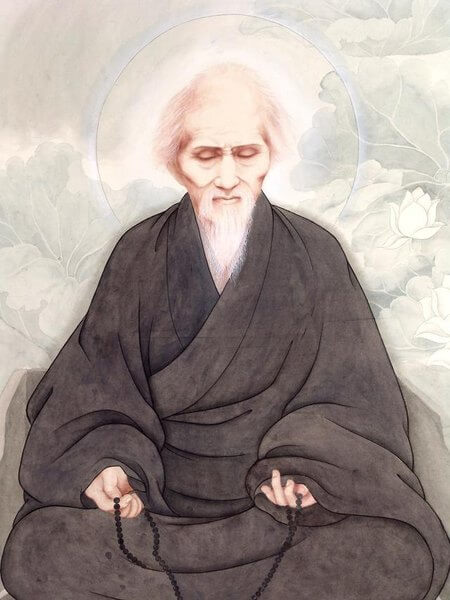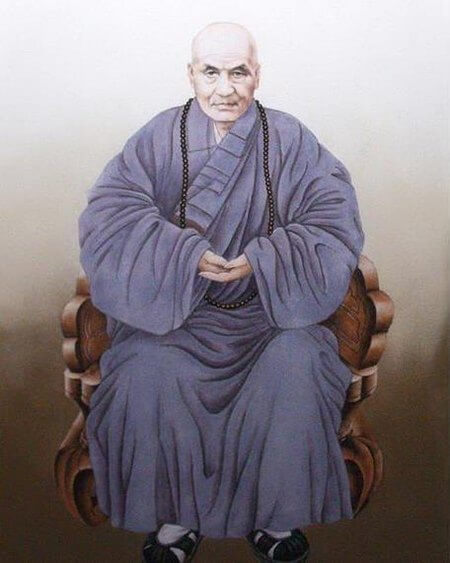In the history of Buddhism, there have been many enlightened patriarchs. They are committed to revitalizing Buddhism and are not afraid of hardships and dangers in their careers. They have affected the world or changed us. In previous posts, we introduced Famous Monks In Ancient China. This article will introduce the famous monks in modern China.
1. Zen Master Xuyun 虚云禅师

Zen Master Xuyun, Han nationality, was born in Quanzhou on September 5, 1840, a native of Xiangxiang, Hunan. His vulgar surname is Xiao, his name is Guyan, and his character is Deqing. After he was sixty years old, he changed the character to Huanyou. The name is Xuyun. It is the great virtue of Zen Buddhism. In 1913, some princes and living Buddhas in Tibet were instigated by the British and Indian governments and refused to recognize the government of the Republic of China. Yuan Shikai Nai ordered the Governor of Yunnan Cai E to prepare to send troops to Tibet. In order to avoid being overwhelmed, Cai Enai asked the old monk Xuyun to venture into the Tibetan area. He invited the respected Dongbao Karmapa in Tibet to lobby the Tibetan Living Buddha, who was in power at that time, to recognize the government of the Republic of China, which eliminated a possible war.
2. Master Yinguang 印光法师

Master Yinguang, who was born in 1861, was born in 1861. He claimed to be a shameless monk. He also admired the founder of the Pure Land School of Buddhism—Master Huiyuan who practiced in Lushan at that time, so he was also named Jilu. Xingzhe, one of the four great monks of the Republic of China. The master’s surname is Zhao, the name is Dangui, the word is Shaoyi, and the title is Ren. He was from Chidong Village, Lujing Town, Yunyang, Shaanxi. The master has made great contributions to the revitalization of Buddhism, especially the Pure Land School, and is one of the most profound influences on Buddhism in modern China. In his later years, Master Yinguang traveled to Jiangsu, Zhejiang, and Shanghai in the Republic of China, and he knew best about the roots of living beings in modern society. His works such as “The Wenchao of Master Yinguang” were known as “Little Sanzang”. In fact, it is the merciful navigation of the end of the Dharma, the light of the dark night, and is the best guide for modern living beings to practice the Dharma, especially the Pure Land Dharma.
3. Master Hongyi 弘一法师
Li Shutong (1880—1942), also known as Li Xishuang, was named Wentao, whose young name was Chengqi, the scientific name was Guanghou, the word Xishuang, and the other name was gargle. Li Shutong is a famous musician, art educator, calligrapher, drama activist, and one of the pioneers of Chinese drama. After returning from studying in Japan, he served as a teacher and editor, and was later ordained as a monk. His name was acting as an actor, the name is Hongyi, and the evening name is Wanqing, and he was later honored as Master Hongyi. Master Hongyi’s contribution to Buddhism is mainly reflected in his research and promotion of Lv Buddhism. In order to revitalize the law, Master Hongyi is not afraid of hardships, in-depth study, concentrated precepts, writing books and practicing. He is a highly respected master of Lvzong in modern Buddhism, and a famous monk in Buddhism at home and abroad.
4. Master Taixu 太虚大师
Taixu (January 8, 1890-March 17, 1947), vulgar surname Lu, nickname Gansen, scientific name Peilin, pen name Tai, Jue, Jinyun, etc., was born in Qitang Township, Chongde County, Zhejiang Province. Haining, Zhejiang, a famous monk in modern times. Master Taixu is a theorist and practitioner in the modern Chinese Buddhist reform movement. In his early years, he was influenced by bourgeois reformism and democratic ideas. At that time, he believed that “after the Chinese political revolution, Chinese Buddhism must undergo a revolution.” Therefore, he devoted his life to the revitalization of Buddhism and the construction of a new era. The cause of Buddhism culture is dedicated to the end of life. He has made outstanding contributions to the establishment of the Sangha Buddhist Academy, training new monks; organizing the lay believers to unite believers from all walks of life; publishing books, newspapers and magazines, and promoting Buddhist culture.
5. Master Yuanying 圆瑛法师
Master Yuanying (1878-1953), the vulgar surname was Wu, and his name was Hongwu after he became a monk. The name was Yuanying, the name of Taoguang, and the master of Yihoutang. He is a native of Gutian County, Fujian Province. His father’s name is Yuanyun and his mother is Que. He prayed to Avalokitesvara Bodhisattva, and gave birth to his son in the fourth year of Guangxu, Qing Dynasty. Master Yuanying served as the president of the “Chinese Buddhist Association” during the Republic of China. The Japanese invaded China and induced him to form and become the president of the pseudo “Chinese Buddhist Association”. Faced with the threat of a hideous pistol, he refused and liberated. Later he served as the first president of the Chinese Buddhist Association. However, he adhered to the clear rules of “no work for a day, no food for a day”. Draught in the temple was difficult and it was necessary to dig a well, so he went down to wash the mud. The house was broken, so he went to the house to repair it.
6. Zen Master Laiguo 来果禅师
Zen Master Laiguo (1881-1953), the layman’s surname was Liu Mingyongli, and his name was Futing. After he became a monk, his name was Miaoshu, the words came to fruit, and the name was pure. A native of Huanggang County, Hubei Province. When he was a child, he was resolute in Taoism. He became a monk at the age of 24, visited Putuo, stopped at Jinshan, and practiced in the south, and he inherited the Dharma of Gaomin. He is the authentic lineage of Linji. After the lord Gao Min, he reorganized the monastery and rebuilt the Brahma temple. In his life, he took the promotion of Dharma and enlightenment as his own responsibility. He taught both ways, received three generals, held both clubs and drinks, and passed the bells and drums. In 1953, he showed silence in Shanghai, and entered the pagoda on the fourth day of April the following year. He was enshrined in the Gaomin Temple to fulfill his vows to “live as a Gaomin man and die as a Gaomin ghost.”
7. Master of Dharma Zun 法尊法师
Master Fa Zun (1902-1980), the layman’s surname was Wen, and his name was Geng Gong. He was a native of Nanzhoubao Village, Shenzhou City. He was a monk at the Yuhuangding Temple of Xiantong Temple in Wutai Mountain and received full ordination at Fayuan Temple in Beijing. He studied in Wuchang Buddhist College and Beijing Tibetan Institute successively, under the tutelage of Master Taixu and Master Dayong, and then went to the Tibetan Studies Corporation organized by Master Dayong to Xikangganzi, and from Qamdo Andong Geshe specializing in Tibetan. He entered Tibet in 1932 and studied at the Drepung Monastery in Lhasa. In 1936, he acted as an agent of Taixu in Chongqing to preside over the Sino-Tibetan Academy until the eve of liberation. In 1950, he presided over the Tibetan translation of the Bodhi Society in Beijing. Served as executive director of the Chinese Buddhist Association, deputy dean and dean of the Chinese Buddhist Academy. He passed away in 1980.
8. Master Dixian 谛闲法师
Master Dixian (1858-1932), from Huangyan, Zhejiang, was named Zhuo three. The Master has worked hard all his life to preach the Dharma, teach people tirelessly, teaches the Tripitaka, learns one way, and is the deity of the rooftops, and has contributed to the decline of modern Buddhism. When Master Dixian was young, he opened a medicine shop to cut the pulse of people to see a doctor. When he encountered poor patients, he didn’t pay for them. He was sent to the doctor to administer medicine. Later, he became a monk and studied Buddhism. He is proficient in Tiantai teaching. He deeply feels the influence of Buddhism on the souls of all living beings in troubled times. Relief is a top priority. After he passed away, the spiritual niche was sent to the Wulei Mountain in Cixi to enter the pagoda, and the people along the way burned incense as a salute, and tens of thousands of people sent off.
9. Master Cihang 慈航法师
Master Ci Hang, the vulgar surname Ai, the name Jirong, the word Yancai, was born in Jianning County, Fujian Province, and was born on the seventh day of August in the 21st year of Guangxu. At the age of 17, he was a monk in Dajinhu, Fujian, followed Master Taixu, toured around China to preach the Dharma, and then visited Nanyang to promote the anti-Japanese national policy; in his later years, he was stationed in Taiwan in Taiwan, founded the “Taiwan Buddhist Academy”, and pioneered the education of Taiwanese Sangha The development of Chinese Buddhism in Taiwan laid the foundation and had a profound influence on Taiwanese Buddhism.
10. Master Nenghai 能海上师
Nenghaishi, native of Mianzhu County, Sichuan, with the vulgar surname Gong and the name Jixi, is a famous patriotic monk in modern times who was a renown and Yuantong. He was a monk at the age of 39 and became a monk at Baoguang Temple, Xindu, Sichuan. He then became a Buddhist monk in the source of Buddhism and became a Zen monk. The forty-fourth line of Linjizong. After he became a monk, he was not afraid of hardships and went to Tibet twice to seek Dharma. He paid tribute to Lama Khangsa, an eminent monk of Tibet, as his teacher. He did his best to reveal the essentials of the Secret Dharma and the true teachings of his mantle. He received the 28th generation of Master Tsongkhapa from the Gelug Sect of Tantric Buddhism. . In his lifetime, he founded Jinci Temple in Chengdu, Yunwu Mountain in Mianzhu, Chongqing, King Kong Dojo in Shanghai, Qingliang Bridge in Wutai Mountain and other tantric monasteries, and made outstanding contributions to the communication of Han-Tibetan Buddhist culture and the peaceful liberation of Tibet.
11. Monk Guangqin 广钦和尚
The old monk Guangqin was born in the home of Huang surnamed in Hui’an County, Fujian Province on October 26 in the eighteenth year of Guangxu in the Xunqing Dynasty. Because of a cold family background, his brother had no money to marry a wife. His teacher was four years old, and his parents sold him to the Li family outside the south gate of Jinjiang County as an adopted son. Father Li Shu, mother Lincai, the teacher has been weak and sick since childhood, but he has wisdom roots, and follows his mother as a vegetarian. A little longer, the adoptive parents passed away one after another, and the land left behind was coveted by close relatives. The teacher was deeply aware of the impermanence of the world, so he sent the field to his close relatives and voted to become a monk at Chengtian Temple in Quanzhou.